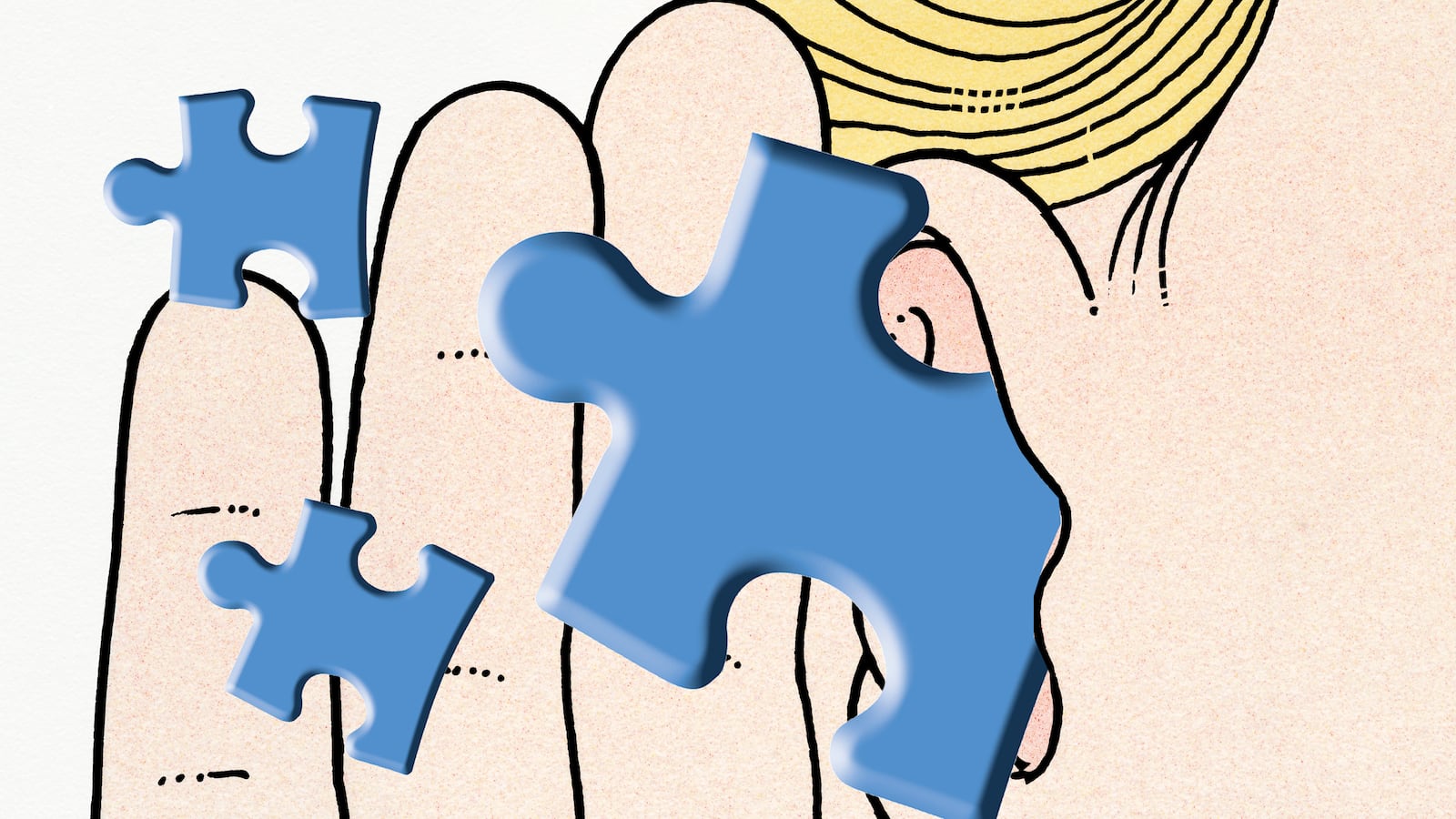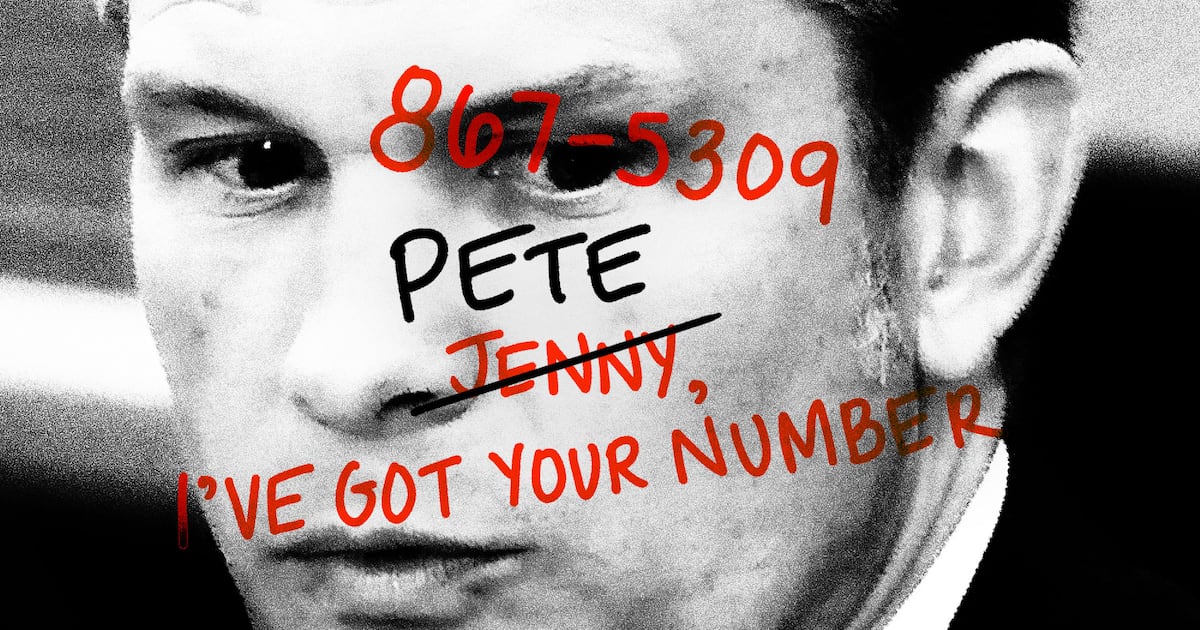From the iconic puzzle-piece decals on minivans to the Empire State Building lit up in blue, Autism Speaks has entered mainstream America. For many, the organization is synonymous with the autism advocacy movement—an incredible feat for an organization that’s been around for less than a decade. Seeing the logo at Major League Baseball games and local walkathons is a sign that a disorder once only associated with Rain Man is getting the mainstream attention and care it deserves.
But for others within the autism advocacy community, Autism Speaks is a deeply flawed organization—one they say that has neither earned the right, nor has the capability to “bring the autism community together as one strong voice” as its mission statement claims.
Former NBC Universal Chief Bob Wright and his wife, Suzanne, started the organization in 2005—about a year after their grandson was diagnosed. At that time, the disorder was diagnosed in 1 in 166 children; today it is 1 in 68. That surge in prevalence is by no means a result of more cases as much as greater awareness, and therefore, medical diagnoses. And that may be a credit to Autism Speaks.
When the Wrights launched Autism Speaks, Bob wrote that the disorder was very much in need of “more public awareness, more understanding, and more funding, both private and public.” Undoubtedly with their help, autism became a household name, an increasing number of doctors became vigilant about spotting the signs, and money flowed for research. When Autism Speaks began, $15 million in private funding went to autism research. In 2010, according to the Interagency Autism Committee (IACC), the federal task force for shaping government autism policy and funding, that amount surged to more than $75 million, with over $18 million from Autism Speaks.
But as Autism Speaks became increasingly successful, more people directly connected to autism—either through having a loved one with the disorder or having it themselves—grew disenchanted. By the end of the first decade of the 21st century, autism advocacy and research was hardly a unified front, fraught with its own schisms over how to direct funding for research and lobbying power.
Nothing was more controversial than the theory that vaccines could be causing autism, though several studies showed no connection. Yet, Autism Speaks kept funding research evaluating a possible link. By 2009, it first chief executive had enough. Alison Singer, the mother of a daughter with autism, resigned from the charity. Her departure was precipitated by her decision as an IACC member to vote against more funding for studies on vaccine safety. “We had a disagreement about scientific research,” Singer tells The Daily Beast. “[Autism Speaks] felt in their heart vaccines were the cause, despite dozens of studies. When you start talking about what you believe and not what data shows, you’re talking about religion and not science.”
That same year, Singer founded the Autism Science Foundation, a nonprofit that explicitly states in its mission statement that “Vaccines save lives; they do not cause autism.”
While Autism Speaks’ continued funding of vaccine research drove Singer’s decision to leave the organization, the nonprofit’s financial efficiency has also perturbed many autism advocates. One of its sharpest critics is the Autistics Self-Advocacy Network, a nonprofit that is focused on helping people with autism advocate on their own behalf. It has slammed Autism Speaks’ funding record—and not without reason.
Compared to other autism nonprofits, Autism Speaks spends a smaller percentage of its revenue on programming. A comparison of 2012 income tax forms found through the Urban Institute shows 70.9 percent of Autism Speaks’ revenue is devoted to program expenses, in comparison to 79.8 percent of the Autistics Self-Advocacy Network’s and 91.5 percent of the Autism Science Foundation’s. Autism Speaks declined to comment on its financial matters.
While Autism Speaks is much bigger and has a larger staff than both of those organizations, the difference in money spent on “current officers, directors, trustees, and other key employees” is striking. For these employees, Autism Speaks spent $2,252,334 in 2012, according to tax filings. In comparison, the Autistics Self-Advocacy Network spent just $65,000 on this class of employees. That was to cover the salary of its president, Ari Ne’eman. In comparison, the former president of Autism Speaks, Mark Roithmayr, had a salary of $436,314 in 2012 and Chief Science Officer Geri Dawson earned $465,671. Eleven other higher-up employees in Autism Speaks earned well into six figures that year. As the head of Autism Science Foundation, Singer doesn’t take a salary.
But it’s more than a matter of spending—or lack thereof—on programs. It’s which programs and research Autism Speaks is choosing to fund. Singer notes that Autism Speaks currently funds research projects outside of the root causes of autism. She cites its nonprofit affiliate, Delivering Scientific Innovation to Autism (DELSIA), which is meant to translate “autism research into life-changing products.” Singer says her nonprofit operates under the belief that “In the long term, it’s more important to cure polio than create the best iron lung. That’s the analogy we use.”
For those who have autism, their opposition to Autism Speaks’ research priorities stems from the nonprofit’s attitude toward the disorder. The organization very publicly created a controversy late last year when co-founder Suzanne Wright released a public statement prior to a national summit in Washington, D.C. Titled “Autism Speaks to Washington—A Call for Action,”. Wright referred to the “autism crisis” and equated having a child with autism to “not living.” She painted a deeply ominous scenario:
“Close your eyes and think about an America where three million Americans and counting largely cannot take care of themselves without help. Imagine three million of our own—unable to dress, or eat independently, unable to use the toilet, unable to cross the street, unable to judge danger or the temperature, unable to pick up the phone and call for help.”
Her words outraged many members of the autism community, especially those who promote self-advocacy. As a result of the post, John Elder Robison, who was the lone board member with autism, resigned from Autism Speaks. Well-known for his books on autism, including Look Me in the Eye, Robison wrote on his website at the time:
“There is a great diversity in our community, which means we have a very broad range of needs. Unfortunately, the majority of the research Autism Speaks has funded to date does not meet those needs, and the community services are too small a percentage of total budget to be truly meaningful. We have delivered very little value to autistic people, for the many millions raised.”
Robison, who now serves as a neurodiversity scholar-in-residence at the College of William and Mary in Virginia, told The Daily Beast he believes that “most of the people at Autism Speaks have good intentions,” but there is an inherent problem with its leadership that is patronizing to individuals, especially adults with autism. “Autism Speaks was founded by grandparents and it is dominated by parents. There are plenty of autistic adults it purports to speak on behalf of. It should be governed by autistic people,” he says.
Michael Rosen, executive vice president of communications at Autism Speaks, acknowledges that no one on the board has autism. However, he tells The Daily Beast that “We have people with autism throughout the organization.” Specifically, he notes, “on the communications committee, we have two people with autism. On the family-service committee, we have two people with autism. One the media team, we have two people with autism.”
Rosen does not believe Autism Speaks takes a patronizing approach to autism and offers programs that serve people across the spectrum. He cites its nation-wide town-hall meetings to encourage people to hire those with autism. “We work on employment and housing initiatives. We’ve got insurance reform in 37 states,” he says. “I like to think we support every single person on the spectrum.”
Still, for some self-advocates, the lack of people with autism in board-level positions underscores problems with Autism Speaks’ approach to the disorder. Robison said he believes Autism Speaks not only treats autism as a “condition of children and infants,” but also promotes an image of people with it as a “diseased group that needs to be eliminated.”
Sharon daVanport, president of the Autism Women’s Network, worries Autism Speaks is “actively work[ing] toward erasing the activism of autistic people as well as disability rights,” she tells The Daily Beast. “When parents of newly diagnosed children Google autism, they often go to Autism Speaks website first. There, they are met with rhetoric highlighting messages of tragedy and hopelessness, instead of diversity consciousness, hope, and support to empower their newly diagnosed child.”
“We don’t want to be talked about as an epidemic or crisis to be combatted,” says Ari Ne’eman, president of the Autistics Self-Advocacy Network. “They view the goal of autism advocacy as a world in which autistic people do not exist. We think we should create a world where autistic people are included and can have a good quality of life.”
He resents Autism Speaks for what he sees as trying to “cure” or rid the world of autism, rather than create better opportunities for people on the spectrum. “If you want to get rid of an inherited condition, it’s getting rid of a population of people. When people say they want a cure, it’s offensive.”
Stuart Spielman, Autism Speaks’ senior policy adviser, rejects this charge. “I have a 20-year-old son who has an intellectual disability in addition to his autism. He can’t speak, and he can’t really take care of himself. He sleeps in a diaper,” he explains. “If you buy into this argument [about cure], I want my son eradicated. That’s crazy. I don’t think there’s a fundamental opposition to looking at autism as having tremendous gifts and at the same time recognizing people with autism, including my son, have tremendous challenges.”
Views on the “cure” approach to autism are very divisive within the autism advocacy movement, and they are dramatically determined by where in the spectrum you or your family member falls. As a spectrum disorder, the diversity in the manifestations of autism means different autism advocates can—and do—have very different perceptions of priorities for the movement.
Because of her experiences with her daughter, who has severe intellectual disabilities and self-injurious behaviors, Singer criticizes the research focus of Autism Speaks, but also disagrees with Ne’eman. “I think when Ari [Ne’eman] talks about autism and I talk about autism, we’re talking about people with different clusters of autism. I know he doesn’t like the word ‘cure.’ If my daughter could function the way Ari could, I would consider her cured,” says Singer. “I have to believe my daughter doesn’t want to be spending time peeling skin off her arm.”
But for advocates with autism, the language of “crisis,” “emergency,” and “cure” in regards to autism is too insulting. And this linguistic difference means concrete battles over autism.
Ne’eman says that Autism Speaks’ philosophy toward curing autism is in line with its larger unwillingness to focus on autism self-advocacy. On Tuesday, Congress debated the Autism CARES Act (which was previously called the Combatting Autism Re-Authorization Act to the chagrin of many advocates). Ne’eman worked with Rep. Jan Schakowsky (D-IL) on an amendment to create more funding for, and increased representation of, autism self-advocates on federal boards, such as the IACC. The amendment “did not end up getting a vote in part because of Autism Speaks,” says Ne’eman. Spielman tells The Daily Beast, “We believe the IACC to be broadly represented and serve the diverse community. I’d like to answer the question that way.”
“Autism Speaks has done a lot of wonderful things. The organization has a lot of fundraising power and the capacity to do a lot of good, but when it destroys support within its own community, it’s the most counterproductive thing it can do,” says Robison. “It’s unfortunate the leadership is out of touch with the community and the language of disability advocacy.”





